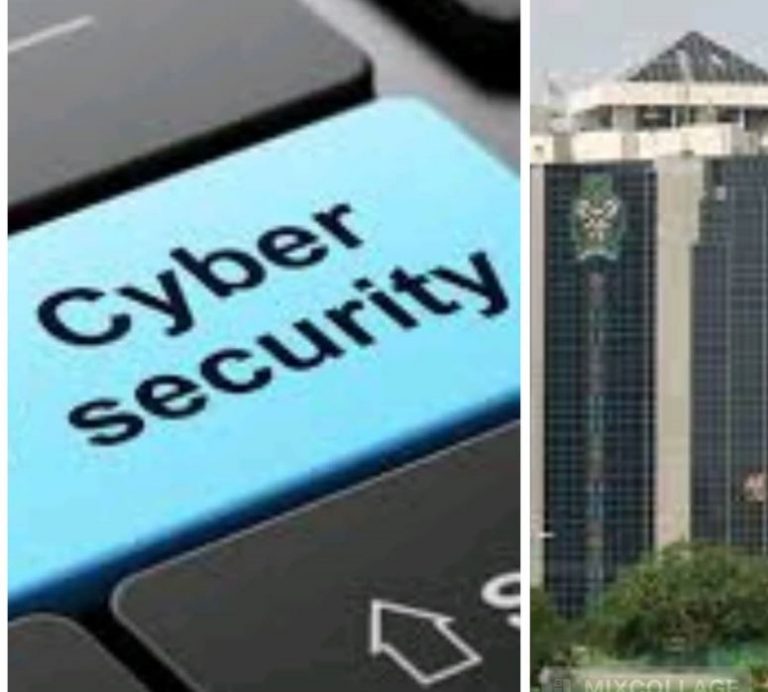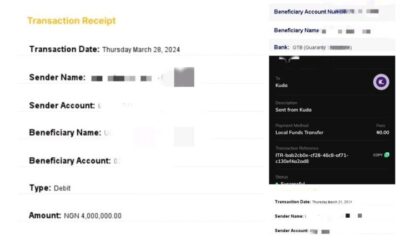Business
Multimillion Naira Gunboat Sinks, NIMASA Denies Responsibility
Published
2 years agoon
By
Editor
The Nigerian Maritime Administration and Safety Agency has denied responsibility for a gunboat that reportedly sank in Lagos on Sunday.
The NIMASA/Barugu, a gunboat reportedly in the fleet of Global West Vessels Specialists, was alleged to have been parked at the Kirikiri Terminal, behind the NIMASA Resource Centre.
In a video circulating online, seafarers onboard the adjoining vessels blamed NIMASA for negligence, they had reported the impending disaster to NIMASA for a long time.
However, the Assistant Director, Public Relations of NIMASA, Osagie Edward, said both the boat and the management had remained a subject of litigation.
According to him, the affected boat has been under the custody of the Economic and Financial Crimes Commission. He said, “Collectively, the boats and their management have remained a subject of litigation and under the custody of the EFCC for years.
“While this is an unfortunate development, it is important to bring to the attention of all that this vessel under reference here is one of Global West boats that were in service with the Agency years ago. This boat has the name NIMASA-Barugu right from the days of the contract. There are also other boats in this contractual category in Warri.”
Osagie added that the agency had made efforts to reactivate some of the boats but has been constrained by legal encumbrances.
READ ALSO: What Sacked Abuja Imam Actually Said Ruring Sermon – Shehu Sani
He stated, “For the avoidance of doubt, it is on record that NIMASA recently made concerted efforts towards reactivating a few of the serviceable boats in this fleet but was constrained by the legal encumbrances due to the nature of the case in court. As a law-abiding entity, we approached the matter under sound legal advisory.
“Finally, it must be stated that this vessel was not in our jetty and under our management at the time of the incident. The crew onboard does not report to NIMASA but to Global West management, its owners. NIMASA remains committed to her statutory responsibility of administering safety and regulating the industry within the ambit of every lawful framework.”
Attempts by The PUNCH to reach the spokesperson of the EFCC, Mr Wilson Uwajeren, were not fruitful.
A former Director, Shipping Development at NIMASA, Enisouh Warredi, claimed Global West was taken to court but not found guilty.
You may like
Business
FULL LIST: 16 Banking Transactions Exempted From CBN’s New
Published
17 hours agoon
May 7, 2024By
Editor
The Central Bank of Nigeria on Monday directed all banks to commence charging a 0.5 per cent cybersecurity levy on all electronic transactions within the country.
The apex bank stated this in a circular signed by the Director, Payments System Management Department, Chibuzo Efobi; and the Director, Financial Policy and Regulation Department, Haruna Mustafa; a copy of which was obtained by The PUNCH.
The circular, which was directed to all commercial, merchant, non-interest, and payment service banks, among others; noted that the implementation of the levy would start two weeks from Monday, May 6, 2024.
READ ALSO: Five Things To Know About The New Cybersecurity Levy To Be Paid By Nigerians
“The levy shall be applied at the point of electronic transfer origination, then deducted and remitted by the financial institution. The deducted amount shall be reflected in the customer’s account with the narration, ‘Cybersecurity Levy,’” the circular partly read.
In this piece, The PUNCH highlights all the 16 banking transactions that are exempted from the CBN’s new cybersecurity levy:
Loan disbursements and repayments
Salary payments
Intra-account transfers within the same bank or between different banks for the same customer
Intra-bank transfers between customers of the same bank
Other Financial Institutions instructions to their correspondent banks
Interbank placements,
Banks’ transfers to CBN and vice-versa
Inter-branch transfers within a bank
Cheque clearing and settlements
Letters of Credits
READ ALSO: FG To Delist Naira From P2P Platforms
Banks’ recapitalisation-related funding – only bulk funds movement from collection accounts
Savings and deposits, including transactions involving long-term investments such as Treasury Bills, Bonds, and Commercial Papers.
Government Social Welfare Programmes transactions e.g. Pension payments
Non-profit and charitable transactions, including donations to registered non-profit organisations or charities
Educational institutions’ transactions, including tuition payments and other transactions involving schools, universities, or other educational institutions
Transactions involving bank’s internal accounts such as suspense accounts, clearing accounts, profit and loss accounts, inter-branch accounts, reserve accounts, nostro and vostro accounts, and escrow accounts.
Business
Five Things To Know About The New Cybersecurity Levy To Be Paid By Nigerians
Published
17 hours agoon
May 7, 2024By
Editor
The Central Bank of Nigeria, on Monday, directed banks and other financial institutions to start charging a cybersecurity levy on all banking transactions.
According to the circular sighted by The PUNCH, the implementation of the levy would start in two weeks.
The circular read in part, “Following the enactment of the Cybercrime (Prohibition, Prevention, etc) (amendment) Act 2024 and pursuant to the provision of Section 44 (2)(a) of the Act, ‘a levy of 0.5% (0.005) equivalent to a half percent of all electronic transactions value by the business specified in the Second Schedule of the Act,’ is to be remitted to the National Cybersecurity Fund, which shall be administered by the Office of the National Security Adviser.”
READ ALSO: CBN Orders Banks To Charge 0.5% Cybersecurity Levy
Here are some things to know about the cybersecurity levy to be paid by Nigerians, according to the CBN circular:
1. A new levy of 0.5%, equivalent to half per cent, is applied to electronic transactions as mandated by the Cybercrime (Prohibition, Prevention, etc) (amendment) Act 2024.
2. The levy is paid by the originator of the electronic transaction and deducted by the financial institution. The deducted amount shall be reflected in the customer’s account with the narration: “Cybersecurity Levy.”
READ ALSO: FG To Delist Naira From P2P Platforms
3. Financial institutions will deduct the levy and remit it to the National Cybersecurity Fund administered by the Office of the National Security Adviser.
4. Deductions shall commence within two weeks from the date of the circular, May 6, and financial institutions must remit collected levies in bulk to the NCF account domiciled at the CBN monthly by the fifth business day of the following month.
5. Financial institutions have deadlines to update their systems to handle levy deduction and remittance. Failure to remit the levy can result in penalties, including a fine of up to 2% of a financial institution’s annual turnover.
Business
FG Gives Deadline To PoS Operators To Register With CAC
Published
17 hours agoon
May 7, 2024By
Editor
The Corporate Affairs Commission has set a two-month deadline for Point of Sale operators in the country to register their agents, merchants and individuals, latest by July 7, 2024.
The Registrar-General/Chief Executive Officer, CAC, Hussaini Magaji, SAN, met with some fintech companies, also known as PoS, on Monday in Abuja, during which the agreement was reached.
Magaji said the measure aims at safeguarding the businesses of fintech customers and strengthening the economy, the commission stated via its X handle, tweeting as @cacnigeria1.
Magaji stated that the move complies with “Section 863, Subsection 1 of the Companies and Allied Matters Act, CAMA 2020 as well as the 2013 Central Bank of Nigeria’s guidelines on agent banking.”
READ ALSO: CBN Orders Banks To Charge 0.5% Cybersecurity Levy
The tweet partly read, “Hussaini Magaji, therefore, said that the timeline for the registration, which will expire on July 7, 2024, was not targeted at any groups or individuals but genuinely aimed at protecting businesses.
“Several speakers from the fintech industry pledged to collaborate with the Commission to ensure hitch-free implementation of the directive.
“Some of them, however, stressed the need for adequate and collective sensitisation to ensure that the exercise achieved the desired results.”
In his remarks, Tokoni Peter, the Special Adviser to President Bola Tinubu on ICT Development and Innovation, “pledged to ensure the smooth facilitation of the process in line with the Renewed Hope Initiative of the present administration.”
READ ALSO: CBN Orders Banks To Charge 0.5% Cybersecurity Levy
Present at the meeting were representatives of fintech companies, including Opay, Momba, Palm Pay, Moniepoint, Paystack, among others.
Aside from being an avenue for job creation, PoS operators play a significant role in financial transactions nationwide.
The move to compel the registration of the fintech companies with the CAC has come at a much-needed time as the companies have also been a key part of fraudulent transactions.
READ ALSO: Pandemonium During Church Service As Man Pulls Gun, Attempts To Shoot Pastor [VIDEO]
In its Annual Fraud Landscape (January to December 2023) report, the Nigeria Inter-Bank Settlement System has said that financial institutions lost about N17.67 billion to fraud in 2023.
It was also reported that the Web and PoS channels were the most exploited payment channels by fraudsters in 2023.
The count of Web Fraud decreased by 38 per cent and ATM fraud recorded a 64 per cent reduction from 2022 to 2023.

Edo Poll: PDP Gubernatorial Aspirant Resigns From Party

Benue To Build Brewery As Residents Spend N850m On Beer Monthly

JUST-IN: Terrorists Kill Two, Abduct 18 In Fresh Kaduna Attack
Trending

 News4 days ago
News4 days ago15-year-Old Public School Student Scores 362 In UTME

 Headline3 days ago
Headline3 days agoPHOTOS: Moment 23-year-old Miss Ecuador Beauty Queen Is Gunned Down In Hail Of Bullets

 Headline4 days ago
Headline4 days agoShock As Woman Who Visited Hospital For Scan Was Told She’s Dead

 Metro1 day ago
Metro1 day agoKidnappers Sleep Off After Abducting Pastor’s Wife, Others In Ondo

 News2 days ago
News2 days agoJUST IN: SERAP Drags 36 Govs, Wike To Court Over N5.9tn, $4.6bn Loans

 Headline3 days ago
Headline3 days agoVIDEO: Arsenal Pay Tribute To 14-year-old British-Nigerian Fan Daniel Anjorin Killed In UK

 Metro2 days ago
Metro2 days agoMan Dies On Top Of Married Woman In Akure

 Headline3 days ago
Headline3 days agoFind The Man Who Stole $30000 From Me, Get $2000 Reward – Nigerian Man Cries Out

 Metro4 days ago
Metro4 days agoDelta Lady Dies After Friends Allegedly Pushed Her Into Pot Of Boiling Pepper [Photos]

 News3 days ago
News3 days agoWhy I Refused To Return Govt Vehicles – Ex-Edo Gov, Shaibu
























